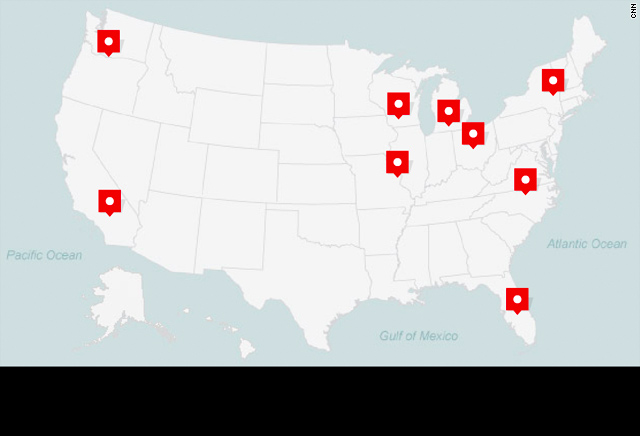States hope to cash in on Florida's rejection of rail funds
- Immediately after Florida Gov. Rick Scott's decision, state jockeying for rail money began
- On Friday, Maryland threw its hat in the ring, following California, Illinois and New York
- Florida officials hope a bipartisan coalition can save Florida rail. Deadline is February 25
(CNN) -- Florida's decision this week to shun federal funding for high-speed rail has set off an auction house-like frenzy among some states hoping to get a bigger piece of the pie.
Republican Florida Gov. Rick Scott said he rejected the rail funds because the risks outweighed the benefits, citing the projected costs to state taxpayers and "overly optimistic" ridership and revenue projections.
The plan "would likely result in ongoing subsidies that state taxpayers would have to incur," he said in a statement Wednesday. "I was elected to get Floridians back to work and to change the way government does business in our state," Scott said.
With his rejection of the highly touted federal money, Scott joined two other Republican governors elected in November -- Wisconsin's Scott Walker and Ohio's John Kasich -- in turning down funds from the White House initiative for national high-speed rail.
Florida was offered $2.4 billion to link Tampa and Orlando by rail. Florida officials had hoped the tracks would be the first of a three-part system that would connect the tourist destinations of Orlando, Tampa and Miami.
The rail funds are part of the Obama administration's American Recovery and Reinvestment Act High Speed Intercity Passenger Rail project, which the White House hopes will make high-speed rail accessible to 80% of Americans by 2035.
The administration recently proposed $53 billion in additional spending on the national high-speed rail project. The plan represents a significant expansion of the $10.5 billion already allocated for high speed rail, including $8 billion in the 2009 economic stimulus package.
Republicans have targeted billions of dollars in cuts from the current year's budget, with high-speed rail one of the targets.
 Map: Proposed high speed rails
Map: Proposed high speed rails
Given the momentum the White House hoped to gain from the states' cooperation, Transportation Secretary Ray LaHood said he was "extremely disappointed" in Scott's refusal to take the funds.
Immediately after Scott's decision, state jockeying to take Florida's share of rail funding began in full force -- including immediate overtures from Illinois, California and New York.
U.S. Sen. Dick Durbin, D-Illinois, wrote LaHood acknowledging the more than $1.4 billion sent to Obama's home state. "But more can be done," Durbin said. "Illinois is ready and willing to put rail dollars to work if other states are not. In fact, the funding dedicated to Florida can accelerate completing other segments of the Chicago Hub high-speed network," Durbin said.
Democratic New York Sen. Kirsten Gillibrand also wrote to LaHood, imploring him to redirect the funds to New York. "These investments will create jobs, spur economic development and continue to build on the growth of ridership we've seen in recent years," she said. "You are keenly aware of the benefits that high-speed rail development would bring New York and the United States, which is why I respectfully request that these dismissed funds be re-appropriated to New York and the Northeast Corridor."
The stakes are high: In December, LaHood announced that 14 states would divvy up the $1.4 billion that Wisconsin and Ohio spurned, with California getting the lion's share. Then-Gov. Arnold Schwarzenegger, a Republican, wrote to the Obama administration at the time: "You are more than welcome to redirect that money to California."
This week, a California lawmaker acknowledged another potential windfall to the state.
"It's a cloudy day in the Sunshine State," Democratic Rep. John Garamendi of Walnut Grove said Wednesday. "But Florida's deep loss is likely to be California's tremendous gain. We're prepared to show the rest of the country what a modern transportation network looks like and will gladly invest every penny the federal government is willing to provide," he said.
On Friday, Maryland threw its hat in the ring. "Maryland and the NEC (Northeast Corridor) would benefit greatly from receipt of the federal high-speed rail funds recently rejected by the governor of Florida," Democratic Maryland Gov. Martin O'Malley said in a statement addressed to LaHood.
In Florida, criticism of the governor's move came from both sides of the political aisle. Some Republican lawmakers wondered if the governor's actions could be sidestepped.
"I don't know constitutionally speaking whether or not this can be rejected by the governor without the consent of the Legislature," Republican State Sen. David Simmons told the Orlando Sentinel. Also, Florida Republican U.S. Rep. John Mica, chairman of the House Transportation Infrastructure Committee, and U.S. Sen. Bill Nelson, a Florida Democrat, said they would try to bypass the governor's decision.
Democratic Rep. Kathy Castor said Floridians could have used the appropriation to create jobs. The funds were originally sought by then-Gov. Charlie Crist, a Republican turned independent.
"Gov. Scott's decision demonstrates a devastating lack of vision for Florida and a lack of understanding of our economic situation," Castor said. "The governor put his own rigid ideology ahead of the best interests of Florida's businesses, workers and families. High-speed rail is projected to create thousands and thousands of jobs in our state."
The Obama administration has given Florida until February 25 to accept the transit funds, according to CNN affiliate WKMG in Orlando. Nelson said state officials were researching a plan to have a private metropolitan organization take oversight of the rail project without the governor.
"Looks like we are going to have to find another entity that would be something other than the state in order to channel the funds through, along with participation of the private companies that are bidding to build and to operate the high-speed rail," Nelson said on his Youtube channel. "We have the lawyers in the Department of Transportation that are now doing the research."







